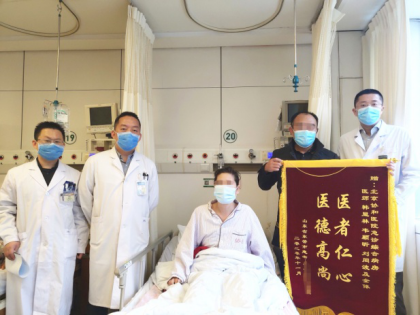At 7 o'clock in the morning on October 30, 2020, an ambulance drove into the emergency department of PUMCH with a warning light. A patient with severe abdominal pain and high fever was lifted out of the car, and a thrilling rescue kicked off.
The doctor at the fever clinic found that the patient had full abdominal tenderness, positive rebound pain, shortness of breath, fast heart rate, high body temperature, and was in critical condition. After completing the necessary COVID-19 screening in the shortest time, the first doctor immediately referred the patient to emergency surgery.
At 8 o'clock, the emergency surgical team took over the patient. Based on the patient's symptoms, signs, and CT examination results, the emergency surgical team judged that the patient had diffuse peritonitis caused by the rupture of a huge abdominal tumor and must be operated immediately, otherwise it would be life-threatening. The emergency surgical team immediately started emergency surgical procedures for critically ill patients. At this time, the blood pressure of patient was suddenly unable to be tested, and he fell into a state of shock and coma. Her condition deteriorated sharply again! The emergency surgical team immediately sent the patient to the rescue room, and while resuscitating shock, they contacted the anesthesiology operating room for preoperative preparations.
At about 9 o'clock, with the full assistance of the anesthesiology operating room, emergency department and related functional departments, the operation started smoothly. A laparotomy by the emergency surgical team found that the patient had a huge small intestinal mass (considering the possibility of gastrointestinal stromal tumors) about 20cm×15cm, accompanied by rupture and perforation, and diffuse peritonitis. The surgical team successfully removed the huge mass on the patient’s abdomen and transferred him to the intensive care department and emergency ward for follow-up treatment. The patient recovered well after the operation.
The successful treatment of this case reflects the high level and efficiency of emergency diagnosis and treatment in our hospital, especially the positive results of the emergency surgical team after the arrival.
Emergency Surgery has been always facing difficulties such as large number of patients, severe illness, and difficulty in assigning multiple disciplines. It is an area with a high incidence of medical risks. PUMCH is the National Diagnosis and Treatment Center for Difficult and Severe Diseases and assumes the responsibility of “the last station for patients’ lives.” To this end, the hospital leaders led the Department of Medical Affiars, the Department of Surgery, the Department of Basic Surgery, and the Emergency Department to conduct repeated investigations, and innovatively proposed the establishment of an emergency surgical team to be responsible for emergency surgery. This proposal received strong support from relevant departments and functional departments. After various preparations, the first emergency surgical team of PUMCH, focusing on basic surgery, officially joined in the Emergency Department on August 3.
Up to now, the emergency surgical team has been running for 3 months and has been well received by all parties and has achieved good social benefits. The team manages operations and consultations in the emergency surgical area full-time, arranges operations in time for patients with surgical indications, “save the most urgent and critical cases” and “devote all that need to do”. The team resolves patients’ pain in time, and avoids patients staying in the observation area for a long time or hastily running back and forth between clinics. The active work of the surgical team allowed emergency patients to receive timely high-level diagnosis and treatment, and patient satisfaction was significantly improved.

The patient sent a banner to the emergency surgery team to express her gratitude.
